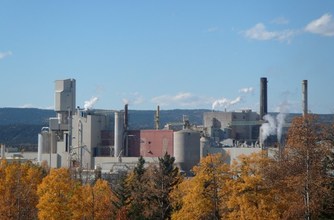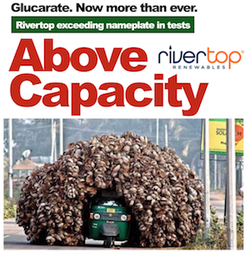|
A disruptive technology that eliminates the need for landfills will soon be operational on Nova Scotia’s South Shore, according to Peter Vinall, CEO of Chester-based Sustane Technologies Inc.
Sustane has developed technology that allows solid waste destined for landfills to be made into clean and valuable products such as fuel pellets. The Sustane facility to be built near the Chester landfill at Kaizer Meadow will divert over 90 per cent of material away from the landfill. Vinall said the Sustane technology is unlike other techniques that create biomass from waste because it lowers contamination by plastics to a negligible 0.1 per cent. Such a low point of contamination means the products have commercial value. “This is the first technology that can take raw garbage destined for landfill and separate it into clean products,” said Vinall, who has worked around the world in the bio-energy and pulp and paper industries. Sustane was the overall winner in the 2016 I-3 Technology Start-up Competition, the biennial contest run by Innovacorp, which recognizes the best new innovative business in Nova Scotia. The company’s winnings totaled $225,000. “The win brings money which is always important, but more than that is the validation,” said Vinall, whose previous roles include president and CEO of the AV Group in New Brunswick. The Sustane core technology was developed by the company’s second co-founder and chief technology officer Javier De La Fuente of Spain. Vinall and De La Fuente met three years ago. “I was looking for something like this and what he was doing was amazing. When we combined this with a new cleaning idea we had the complete solution….” Vinall said. The pair founded Sustane in 2014 with chief financial officer Robert Richardson, an accountant and businessman. Work on the $15 million Chester plant will begin this spring. Click here to read the full story.  The West Fraser Timber Co.’s pulp mill in central Alberta has begun making more than just wood pulp for paper. The forest products company has completed work on Canada’s first commercial-scale lignin recovery plant, which is designed to extract a natural wood byproduct called lignin and repurpose it for use in a range of new value-added products. “Foresters have long been searching for ways to put lignin to better use,” Steve Price, CEO of one of the project’s funders, Alberta Innovates Bio Solutions, said. “The ability to recover lignin and transform it into green bioproducts will add more value to an abundant Alberta biomass and contribute to the provincial economy in a sustainable way,” Along with a $3 million contribution from AI Bio, the $30 million plant received funding from the federal government through Natural Resources Canada and Sustainable Development Technology Canada, as well as from West Fraser itself. The facility is one of many examples of a Canadian company leveraging a sustainable material to create products that reduce the overall economy’s reliance on coal, crude oil and natural gas. Read the full story at CanadianManufacturing.com.  Benchmark tests prove higher volumes than initial forecast; plant receives “Recommended” rating after first customer audit In Montana, Rivertop Renewables, a Montana-based novel chemicals company, announced it exceeded the nameplate capacity of its first commercial production facility during benchmark testing. At full capacity the plant, operated by DTI in Danville, Virginia, is now capable of producing more than 9 million dry pounds of sodium glucarate product per year, an increase of approximately 15 percent over original design projections. Additionally, last month the plant received its first supplier “Recommended” rating in a quality and supply chain audit by a leading water treatment industry customer. “Construction, start up and full-capacity runs at the DTI facility have gone extremely well,” said Mike Knauf, chief executive officer of Rivertop. “The pace of our efforts is proving not only the breakthrough efficiency of Rivertop’s technology, but also the low capex requirements for our proprietary manufacturing process.” The capacity at the DTI facility will allow Rivertop to expand sales of its existing products as well as provide customers quantities suitable for joint development and testing. The success of this facility is the first step and Rivertop plans to build additional plants to transform renewable plant sugars into a variety of sustainable, cost-competitive chemical products. Click here to read more Cellufuel Inc. receives $2,152,693 funding from Sustainable Development Technology Canada (SDTC)4/4/2016
Cellufuel Inc. has received $2,152,693 funding from SDTC to development a drop-in renewable fuel from cellulosic biomass.
A drop-in biofuel – made from biomass that is chemically indistinguishable from petroleum-based fuel and compatible with currently used fuel infrastructure and engines – has been difficult to produce. Cellufuel’s catalytic depolymerisation technology converts wood into renewable diesel that meets the quality of petroleum diesel. This project will build a demonstration scale plant at a former newsprint mill, demonstrating the commercial viability of the process including the production cost and product quality. Cellufuel leveraged $4,370,619 in additional funding for a total project value of $6,523,312. Cellufuel Inc. is a Nova Scotia based start-up that is focused on the production of synthetic renewable fuels from forestry biomass. They will be included as a Technology Tour location during the 2016 Atlantic Biorefinery Conference. Click here to learn more. |
Archives
May 2018
AuthorThe organizers of the Atlantic Biorefinery Conference will keep you informed on deadlines, speakers, and other updates. Categories |
bioproducts - biofuels - aquaculture - agriculture - agrifood - marine - municipal solid waste
The Atlantic BIOCON Conference is hosted by the Greenspring Bioinnovation Hub.


